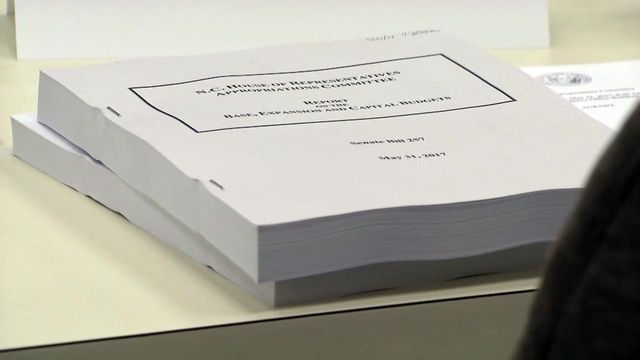House finally releases pay details in spending plan
After several days of trickling out portions of its 2017-18 budget proposal, House leaders on Wednesday revealed details of pay increases for teachers and state workers.
Posted — Updated"This is a sound, responsible budget, one that addresses the needs of our citizens while moving this state forward," Rep. Nelson Dollar, R-Wake, the chief budget writer in the House, said of the $22.9 billion plan.
Average teacher salaries would go up about 3.3 percent in the coming year under the House plan, which is lower than the Senate, but teachers would get about a 9.5 percent raise over two years in both plans. Gov. Roy Cooper called for 5 percent raises in each of the next two years.
"I think this sends a signal to teachers and state employees that they are truly valued," Dollar said.
While lawmakers have focused on boosting salaries of beginning teachers in recent years, the House budget would give the largest bumps to teachers with 16 to 24 years in the classroom. It also would provide a $2,500 bonus to teachers with at least 27 years' experience who sign a two-year contract.
"Veteran teachers are treated better than in the Senate budget, but it still doesn't go to the level of the governor," said Mark Jewell, president of the North Carolina Association of Educators. "It also leaves several folks with very small increases that, when you take in the increase in health insurance premiums, they'll actually be making less than last year."
Meanwhile, state employees would get a $1,000 raise in each of the next two years, along with an extra five days of leave. State retirees would get a one-time 1.6 percent cost-of-living adjustment to their pension checks. The Senate budget doesn't include any COLA for retirees and gives state workers a raise of 1.5 percent or $750, whichever is greater.
Ardis Watkins, director of government relations for the State Employees Association of North Carolina, scoffed at Dollar's assessment that the proposed budget values state workers.
"Every single budget so far has shown that state employees are not a priority," Watkins said. "There's choices being made here, and state employees are just not that choice."
"We are continuing to work on the issue (of improving employee pay). We believe that we need to do more work," Dollar responded.
"You have to put your money where your mouth is and show your thankfulness. The verbal thanks are appreciated by state employees, but what they tell us is they've got to feed their families," Watkins said. "In a time of great surplus in the state budget – and it's the third year of really good surpluses – if state employees are not going to matter now, they're never going to matter."
Most budget tweaks fly through
During the morning session, many lawmakers expressed concern about state spending for mental health, such as crisis beds designed to keep mentally ill people out of hospital emergency rooms and local jails to efforts.
"We understand there's a problem here. We understand the state has to step up and do more," said Rep. Chris Malone, R-Wake, chairman of the Health and Human Services Appropriations subcommittee.
Yet, few of the 60 or so amendments taken up Wednesday afternoon had to do with mental health. Most made technical adjustments to the bill or moved small pots of money for pet projects, and they flew through with little debate.
A handful of amendments generated considerable debate, such as using road maintenance money for a pilot program for charter school transportation (passed), cutting school voucher funds to help school districts deal with mandatory class size reductions (failed), nixing the proposed move of the state Human Relations Commission (failed) and shifting rural grant funds to the Department of Agriculture and Consumer Services for legal fees to challenge the federal Waters of the U.S. provision (passed).
Dollar said he believes the overall budget will make North Carolina more competitive.
"We're a state that competes in a global marketplace, and I believe we're good at it," he said. "This budget, on behalf of this House, furthers that competition to put our people in the best position globally to realize their dreams, to be able to seize their opportunities."
But Cooper said the House could have done better.
"This House budget shortchanges our state at a time when we don't have to. It falls far short of what is needed on education and jobs, and I urge the House to do better for our families," Cooper said in a statement.
Related Topics
• Credits
Copyright 2024 by Capitol Broadcasting Company. All rights reserved. This material may not be published, broadcast, rewritten or redistributed.





